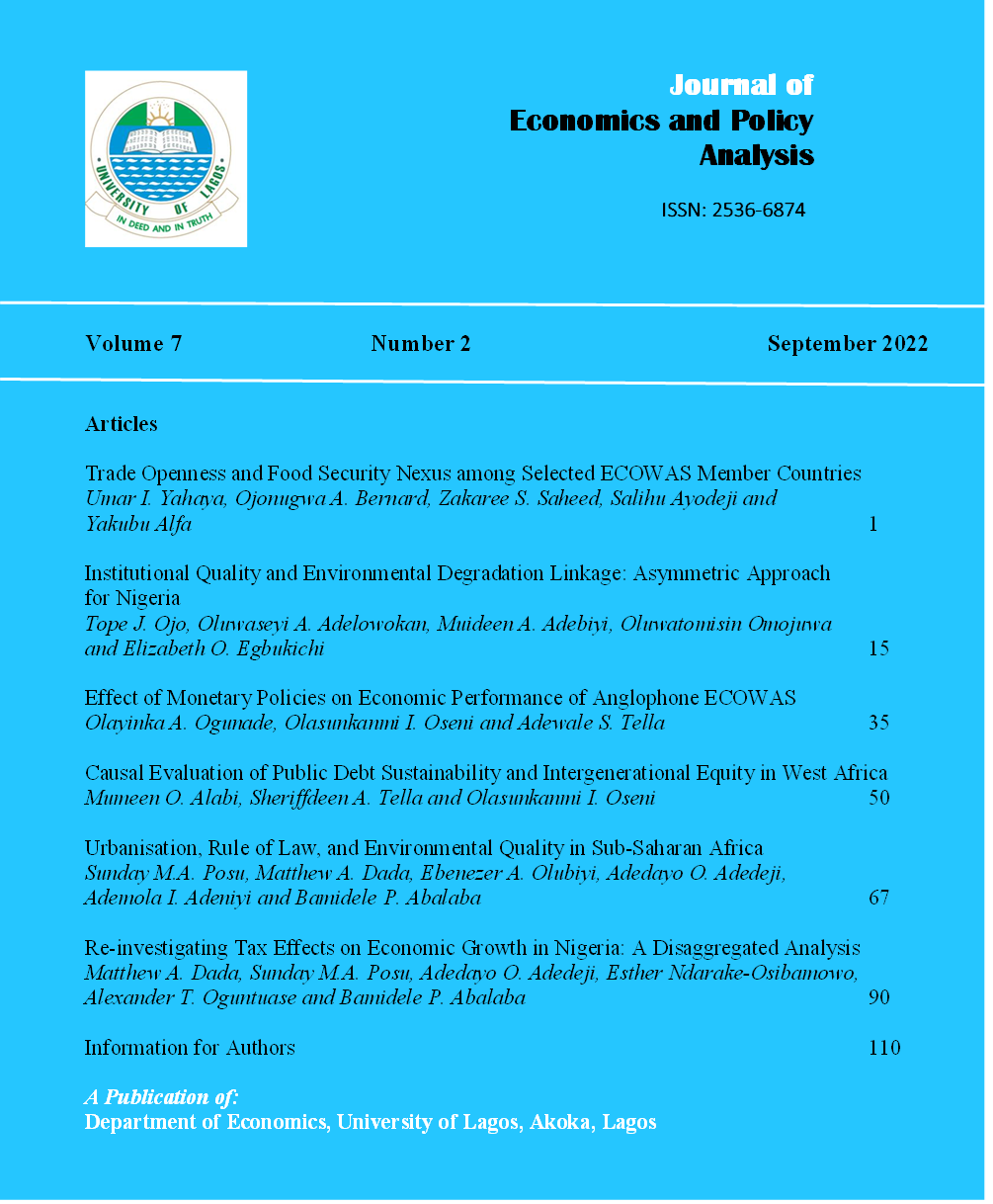Re-investigating Tax Effects on Economic Growth in Nigeria: A Disaggregated Analysis
Abstract
Taxation stands as a pivotal fiscal tool in economic management, affecting growth either positively or negatively. This study, spanning 1990-2022, delves into disaggregated analysis of tax effects on economic growth, considering variables like domestic investment, trade volume, inflation, unemployment, and population. The study scrutinises five key tax elements: Personal income tax, corporate income tax, petroleum profit tax, education tax, and customs and excise duties. With data sourced from various reputable institutions, the analysis reveals that personal income tax exerts a short-run positive influence on economic growth while petroleum profit tax exerts nil effect, similarly to customs and excise duties, corporate income tax, and education tax in both the short-run and the long-run. The result also shows that domestic investment and trade volume are positively signed while inflation, unemployment, and population are negatively signed but have weak influence on economic growth. Short-run dynamics are captured through error correction terms, suggesting a robust relationship among variables and the potential for adjustment to equilibrium. The study concludes with a call for a comprehensive overhaul of Nigeria's tax policy to foster the desired growth, alongside urgent measures to address inflation, unemployment, and population growth while bolstering trade volume and domestic investment.
References
Afolabi, H. O (2017). Effects of taxation on economic growth in Nigeria. Osogbo Journal of Management, 2(3), 37 – 46.
Afuberoh, D., & Okoye, E. (2014). The impact of taxation on revenue generation in Nigeria: A study of Federal Capital Territory and selected states. International Journal of Public Administration and Management Research. 2(2), 22-47.
Aliyu, A. B., & Mustapha, A. A. (2020). Impact of tax revenue on economic growth in Nigeria (1981-2017). Bullion, 44(4), 5.
Appah, E., & Oyadonghan, J. K. (2011). The challenges of tax mobilization and management in the Nigerian economy. Journal of Business Administration, 6(2), 128-136
Arvin, M. B., Pradhan, R. P., & Nair, M. S. (2021). Are there links between institutional quality, government expenditure, tax revenue and economic growth? Evidence from low-income and lower middle-income countries. Economic analysis and policy, 70, 468-489.
Basumatary, J. (2022). Effects of tax revenue and capital expenditure on economic growth: A case study of the Union Territory of Puducherry, India. India, February 10. http://dx.doi.org/10.2139/ssrn.4031186/
Blanchard, O., & Summers, L. H. (1986). Hysteresis and the European unemployment problem. In NBER Macroeconomics Annual 1, 15–90. MIT Press.
Bloom, D. E., Canning, D., & Sevilla, J. (2003). The Effect of health on economic growth: A production function approach. World Development, 32(1), 1–13.
Edewusi, D. G., & Ajayi, I. E. (2019). The nexus between tax revenue and economic growth in Nigeria. International Journal of Applied Economics, Finance and Accounting, 4(2), 45-55.
Egbunike, F. C., Emudainohwo, O. B., & Gunardi, A. (2018). Tax revenue and economic growth: A study of Nigeria and Ghana. Signifikant Jurnal Ilmu Ekonomi, 7(2), 213-220.
Ehigiamusoe, U. K (2014). The nexus between tax structure and economic growth in Nigeria: A prognosis. Journal of Economic and Social Studies 4(1) https://doi.org/10.14706/JECOSS11417/
Eneche, E. O., & Stephen, I. A. (2023). Tax revenue and Nigeria economic growth. 7(2), 60-80 https://doi.org/10.26417/ejss.v3i1.p30-44.
Fuest, C., & Riedel, N. (2020). Tax policy and economic growth: A survey. CESifo Working Paper Series No. 8162.
Gurdal, T., Aydin, M., & Inal, V. (2021). The relationship between tax revenue, government expenditure, and economic growth in G7 countries: new evidence from time and frequency domain approaches. Economic Change and Restructuring, 54, 305-337.
Ibadin, P. O. & Oladipupo, A. O. (2015). Indirect taxes and economic growth in Nigeria. Prihvaceno za tisak, 345-364
Jelilof, G., Abdulrahman S. & Isik, A. (2016). The impact of tax reforms and economic growth in Nigeria. The Empirical Letters, 15(5), 435-443.
Johansson, Å., Heady, C., Arnold, J., Brys, B., & Vartia, L. (2008). Taxation and Economic Growth. OECD Economics Department Working Papers, No. 620.
Kumar, S., & Woo, J. (2010). Public Debt and Growth. IMF Working Papers, 10(174), 1–28.
Maganya, M. H. (2020). Tax revenue and economic growth in developing country: an autoregressive distribution lags approach. Central European Economic Journal, 7(54), 205-217.
Manukaji, I. I. (2018). Effect of tax structure on economic growth in Nigeria. International Journal of Innovative Finance and Economic Research, 6(1), 1-11
Nchege J., Aduku, E. B., Ezinne, I. & Nwosu, S. C. (2019). Tax revenue, wage employment and economic growth in Nigeria.” Journals of Economic and Sustainable Development, 10(10), https://doi.org/10.7176/JESD/10-10-11/
Nicita, A., Olarreaga, M., & Teh, R. (2011). Sugar prices, labour income, and poverty in Brazil. Journal of International Development, 23(2), 180–206
Nzotta, S. M. (2007). Tax evasion problems in Nigeria: A critique. Nigerian Accountant, 40(2), 40-43
Ogundana, O. M, Ogundana, O. M, Ogundana, M. O, Ibidunni, A. S & Adetoyinbo, A. (2017). Impact of direct and indirect taxes on the Nigerian economic growth. Binus Business Reviews 8(3). 215-220. https://doi.org/10.21512/bbr.v8i3.3621/
Otu, O. H., & Adejumo, T.O. (2013). The effects of tax revenue on economic growth in Nigeria. (1970-2011). International Journal of Humanities and Social Science Invention. 2(6), 16-26
Saheed, Z. S., Abarshi, J. A., & Ejide, I. S. (2014). Impact of petroleum tax on economic growth in Nigeria (1970-2012). International Journal of Education and Research, 2(11), 297-308.
Salami, G. O., Apelogun, K. H., Omidiya, O. M., & Ojoye, O. F. (2015). Taxation and Nigerian economic growth process. Research Journal of Finance and Accounting. 6(10), 93-101.
Soyode, L. & Kajola, S. O. (2006). Taxation Principals and Practice in Nigeria. Ibadan, Nigeria, Solicon Publishers
Umoru, M. A. (2013). Tax structure and Economic Growth in Nigeria: disaggregated empirical evidence. Research journal of Finance and Accounting 4(2).
Uzonwanne, M. C. (2015) The indispensable role of taxation for state development in Nigeria International Journal of Economic Resource, 48-59.


